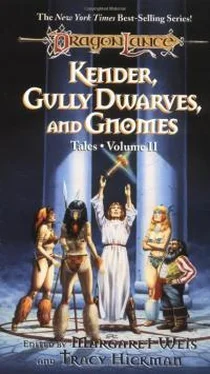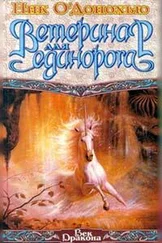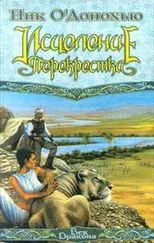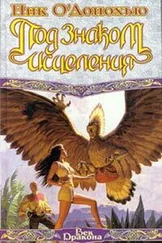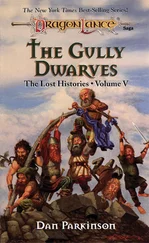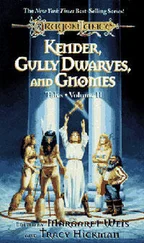Ник О'Донохью - Kender, Gully Dwarves, and Gnomes
Здесь есть возможность читать онлайн «Ник О'Донохью - Kender, Gully Dwarves, and Gnomes» весь текст электронной книги совершенно бесплатно (целиком полную версию без сокращений). В некоторых случаях можно слушать аудио, скачать через торрент в формате fb2 и присутствует краткое содержание. Год выпуска: 1987, Жанр: Фэнтези, на английском языке. Описание произведения, (предисловие) а так же отзывы посетителей доступны на портале библиотеки ЛибКат.
- Название:Kender, Gully Dwarves, and Gnomes
- Автор:
- Жанр:
- Год:1987
- ISBN:нет данных
- Рейтинг книги:5 / 5. Голосов: 1
-
Избранное:Добавить в избранное
- Отзывы:
-
Ваша оценка:
- 100
- 1
- 2
- 3
- 4
- 5
Kender, Gully Dwarves, and Gnomes: краткое содержание, описание и аннотация
Предлагаем к чтению аннотацию, описание, краткое содержание или предисловие (зависит от того, что написал сам автор книги «Kender, Gully Dwarves, and Gnomes»). Если вы не нашли необходимую информацию о книге — напишите в комментариях, мы постараемся отыскать её.
Kender, Gully Dwarves, and Gnomes — читать онлайн бесплатно полную книгу (весь текст) целиком
Ниже представлен текст книги, разбитый по страницам. Система сохранения места последней прочитанной страницы, позволяет с удобством читать онлайн бесплатно книгу «Kender, Gully Dwarves, and Gnomes», без необходимости каждый раз заново искать на чём Вы остановились. Поставьте закладку, и сможете в любой момент перейти на страницу, на которой закончили чтение.
Интервал:
Закладка:
Line 12: Where the heart and the mind ride unquestioned.
A reference to the poet’s “Lost Years” (see Part II of the essay) in which, dazed and electrocuted, he wandered the lands of Krynn. Armavir always suspected he was under Flint’s care at the time.
Line 14: In his fathering arms, the spirit gathered.
A punning reference to the dwarf’s fondness for distilled spirits, a vice Caramon Majere (himself no teetotaller, as I recall) had the audacity to claim was Armavir’s own. Flint in fact gathered the dwarf-spirits on the pretext that he was keeping them out of Armavir’s hands, but indeed these particular spirits dwindled unexplainably in his care (however, see note to lines 19-23 below).
Lines 19-23: One from a haven ... and green again.
He hated Tasslehoff. That fake innocence and false cheeriness masked the fact that the kender was a cold-hearted squirrel of a creature, Tanis’s pet vole. We know who really found the Dragon Orb at the High Clerist’s Tower, don’t we, you plundering, pony-tailed little pipsqueak? We also know who it was that was nipping Flint’s firewater and refusing to scold Armavir after the blame was passed elsewhere, not, as the others thought, out of a natural soft-heartedness, but because it suited him to appear naturally soft-hearted, and in doing so, to shift the blame more easily elsewhere, because the smarter ones—Raistlin and old Flint—would have thought a self-righteous lecture was strangely out of character.
In composing the “Song of the Ten Heroes” Armavir had to put this third stanza in to stave off the kender’s hard feelings (yes, some poetry is most fanciful, most feigning), and perhaps it was even a sincere gesture on the poet’s part to say that his own hard feelings he was willing to put aside? But what does Mister Minimus, everybody’s favorite, do? Tries to steal this manuscript, readers—the very manuscript you’re reading at this moment. Wanted to publish it under his name, change it a little to prove he wrote the Dragonlance songs, when even the “Kender Trailsong [23] Chronicles , I, p. 75. Caramon deftly changed the name of this (though why he would choose “Trailsong” is beyond this humble writer). It was written some years after the war, in a moment of abject bitterness, for Caramon himself (Tika being the “one true love” of the poem). Reorx knows what Tasslehoff sang before the centaurs, but it wasn’t this.
” and “Kender Mourning Song [24] Chronicles , III, p. 261. He’d even claim this as his own, that bald-faced little graverobber of metaphor!
” were not his, and his “Song of Courage [25] Legends , II, p. 86. The last two stanzas are Armavir’s, the first two Tasslehoff’s perversion. Side by side (or rather, one on top of the other) they produce an astonishing contrast in quality that is evident to this day.
” an insipid little number he twisted by changing some words from the original text!
I stole back the manuscript (poetic justice!), all but 700 or so pages, none of which had anything to do with who wrote the songs but were simply a learned treatise on kleptomania, from which you should read and benefit, rodent!
Lines 28-32: The next from ... she came.
Goldmoon. The phrase “bearing a staff” refers not only to the Blue Crystal Staff that the original Chronicles fussed over so, but also to the Que-Shu princess’s rather numerous personal staff of handmaidens, pages, and other attendants—a rather large group of Plainsmen who appear nowhere in the original Chronicles . Often the highly revered Priestess of Mishakal implored Tanis to give up the quest, complaining of muscle cramps, of Flint’s and Caramon’s (and Armavir’s) tendency not to bathe (but given Armavir’s tragic past, surely he feared water as that most powerful of electrical conductors, and would have stood, as I stand now, afloat on the writing table, dry and safe for the time being as the waters in this cell keep rising ...), complaining loudly, upon first handling the disks of Mishakal, that she had broken a fingernail.
Plains tribes were scattered as much through vagrancy and underemployment as through anything the draconians were doing at the time, and the fact is that they were confined to a life of wandering and forage merely because so many of the more promising young people among them were hastened off to dance attendance on the various Chieftains and Chieftain’s daughters. Those who were left were essentially scavengers, as evidenced below.
I have an additional paragraph regarding Goldmoon, which shall not be published until after River-wind’s death (see note to lines 46-50).
Lines 37-41: The next from ... space into light.
Riverwind. “Hierarchies of space” indeed, for the poor man was completely boggled by his semi-successful quest for the Blue Crystal Staff [26] A longer poem of Armavir’s about this adventure appears elsewhere, conveniently pirated by that Solamnic Knight of the Rose, Michael Williams, who should remember that the Order of the Rose urges its knights to take pity on those less fortunate rather than to steal their verses.
. He was indeed “in the shadow of the moon,” and Armavir constructs a marvelous pun in line 37. In Goldmoon’s shadow is the obvious reading—he was slavishly devoted to her—but in addition, Armavir means to suggest that the Plainsman walked beneath the shadow of Lunitari, the moon from which the common speech derives the term “lunatic.”
Frankly, the Plainsman was frightening, and although Armavir hoped devoutly to wake one morning and find a kender topknot (complete with, possibly, kender noggin) dangling from Riverwind’s belt, the poet never really ventured to make acquaintance with the hunter, who suffered from all kinds of delusions, including one that he had been raised by leopards, the only support for which was a slight lack of personal cleanliness and a tendency to glaze over and grow abstract when Goldmoon stroked the top of his head (a condition that Armavir thought resembled hypnosis, although the hypnotic suggestion “you are now ... a chicken!” had no visible effect on either the Plainsman’s humanity or courage).
Lines 46-50: One within absences ... awakening and thought.
Kitiara. Through a keyhole, Armavir saw her taking a bath once, and Great Reorx! she was lovely and dark and glistening with waterdrops, but a big thing for the likes of us. Nonetheless, only the fact that the door was locked kept the poet from donning his water wings (not yet remembering where they had come from, but knowing that somehow they were ambitious and tragic) and, as he says in the farewell note he wrote for Tanis [27] Chronicles , III, p.5.
(who, characteristically, was completely at sea over how to begin the note) “take in the darkness/blessed and renamed by pleasure.”
Armavir used the keyhole research method on several other occasions (see notes to lines 92 and 93).
Lines 55-59: One in the heart ... forever an heirloom.
Sturm. From this distance, it is sometimes difficult to understand the amount of posturing that went on among the Companions: Tanis wavering and serious and oh so tragic, like a moonstruck ship’s captain; Tasslehoff’s infuriating innocence (I remind you that, yes, a snake is innocent, too); Goldmoon and Laurana like princesses from old romances they probably never had time to read in their devout attention to hair, eye shadow, and manicure.
Sturm was different, and undeniably dangerous, for he believed all of that posturing. It was as though someone had made him up, had said, “We need a perfect, gentle knight to play a role in the story. How about this one?” As a result, some criticism of the Chronicles has arisen in cynical circles (primarily, those of the elves)—the suspicion that Sturm is, indeed, a fictional character, added to the Chronicles so that the humans might be represented even more overwhelmingly than they are now.
Читать дальшеИнтервал:
Закладка:
Похожие книги на «Kender, Gully Dwarves, and Gnomes»
Представляем Вашему вниманию похожие книги на «Kender, Gully Dwarves, and Gnomes» списком для выбора. Мы отобрали схожую по названию и смыслу литературу в надежде предоставить читателям больше вариантов отыскать новые, интересные, ещё непрочитанные произведения.
Обсуждение, отзывы о книге «Kender, Gully Dwarves, and Gnomes» и просто собственные мнения читателей. Оставьте ваши комментарии, напишите, что Вы думаете о произведении, его смысле или главных героях. Укажите что конкретно понравилось, а что нет, и почему Вы так считаете.
